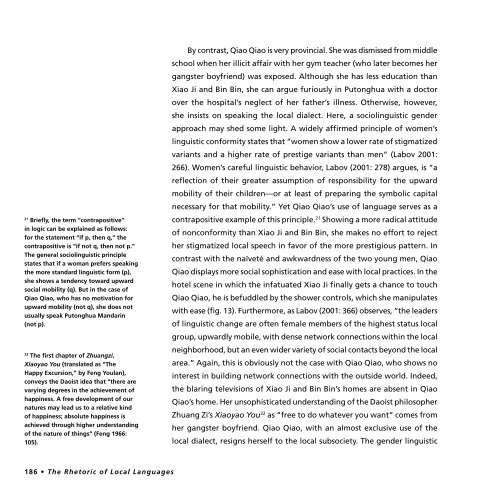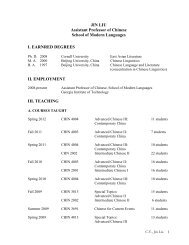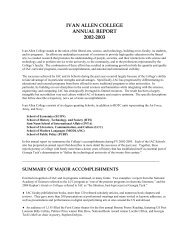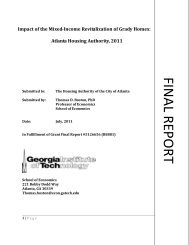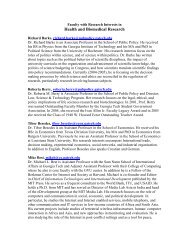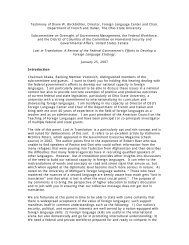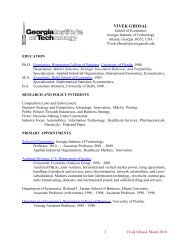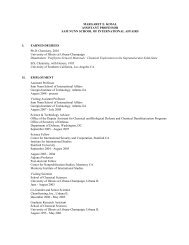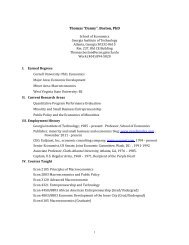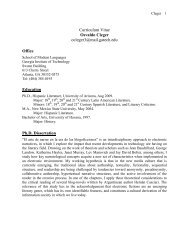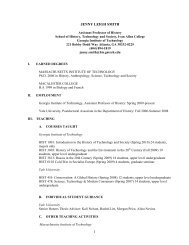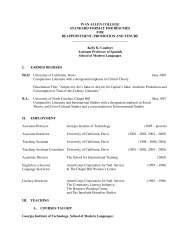Read this paper
Read this paper
Read this paper
Create successful ePaper yourself
Turn your PDF publications into a flip-book with our unique Google optimized e-Paper software.
21<br />
Briefly, the term “contrapositive”<br />
in logic can be explained as follows:<br />
for the statement “if p, then q,” the<br />
contrapositive is “if not q, then not p.”<br />
The general sociolinguistic principle<br />
states that if a woman prefers speaking<br />
the more standard linguistic form (p),<br />
she shows a tendency toward upward<br />
social mobility (q). But in the case of<br />
Qiao Qiao, who has no motivation for<br />
upward mobility (not q), she does not<br />
usually speak Putonghua Mandarin<br />
(not p).<br />
22<br />
The first chapter of Zhuangzi,<br />
Xiaoyao You (translated as “The<br />
Happy Excursion,” by Feng Youlan),<br />
conveys the Daoist idea that “there are<br />
varying degrees in the achievement of<br />
happiness. A free development of our<br />
natures may lead us to a relative kind<br />
of happiness; absolute happiness is<br />
achieved through higher understanding<br />
of the nature of things” (Feng 1966:<br />
105).<br />
By contrast, Qiao Qiao is very provincial. She was dismissed from middle<br />
school when her illicit affair with her gym teacher (who later becomes her<br />
gangster boyfriend) was exposed. Although she has less education than<br />
Xiao Ji and Bin Bin, she can argue furiously in Putonghua with a doctor<br />
over the hospital’s neglect of her father’s illness. Otherwise, however,<br />
she insists on speaking the local dialect. Here, a sociolinguistic gender<br />
approach may shed some light. A widely affirmed principle of women’s<br />
linguistic conformity states that “women show a lower rate of stigmatized<br />
variants and a higher rate of prestige variants than men” (Labov 2001:<br />
266). Women’s careful linguistic behavior, Labov (2001: 278) argues, is “a<br />
reflection of their greater assumption of responsibility for the upward<br />
mobility of their children—or at least of preparing the symbolic capital<br />
necessary for that mobility.” Yet Qiao Qiao’s use of language serves as a<br />
contrapositive example of <strong>this</strong> principle. 21 Showing a more radical attitude<br />
of nonconformity than Xiao Ji and Bin Bin, she makes no effort to reject<br />
her stigmatized local speech in favor of the more prestigious pattern. In<br />
contrast with the naïveté and awkwardness of the two young men, Qiao<br />
Qiao displays more social sophistication and ease with local practices. In the<br />
hotel scene in which the infatuated Xiao Ji finally gets a chance to touch<br />
Qiao Qiao, he is befuddled by the shower controls, which she manipulates<br />
with ease (fig. 13). Furthermore, as Labov (2001: 366) observes, “the leaders<br />
of linguistic change are often female members of the highest status local<br />
group, upwardly mobile, with dense network connections within the local<br />
neighborhood, but an even wider variety of social contacts beyond the local<br />
area.” Again, <strong>this</strong> is obviously not the case with Qiao Qiao, who shows no<br />
interest in building network connections with the outside world. Indeed,<br />
the blaring televisions of Xiao Ji and Bin Bin’s homes are absent in Qiao<br />
Qiao’s home. Her unsophisticated understanding of the Daoist philosopher<br />
Zhuang Zi’s Xiaoyao You 22 as “free to do whatever you want” comes from<br />
her gangster boyfriend. Qiao Qiao, with an almost exclusive use of the<br />
local dialect, resigns herself to the local subsociety. The gender linguistic<br />
186 • The Rhetoric of Local Languages<br />
MCLC 18.2.indd 186<br />
12/20/06 2:01:38 PM


